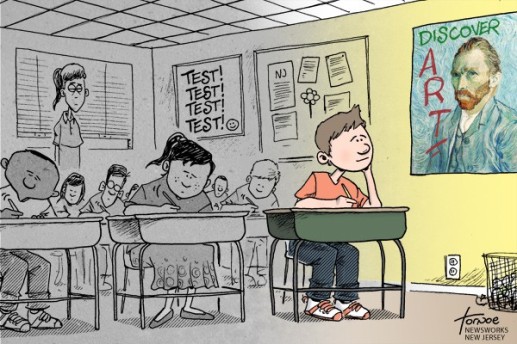Society in every state is a blessing, but government even in its best state is but a necessary evil; in its worst state an intolerable one; for when we suffer, or are exposed to the same miseries by a government, which we might expect in a country without government, our calamity is heightened by reflecting that we furnish the means by which we suffer.
~ Thomas Paine, Common Sense, 1776
Free and open societies can benefit from uniform learning standards that guide and shape classroom instruction to prepare future learners, leaders, inventors, artisans, entrepreneurs, tradesmen, artists, teachers, mentors, volunteers, etc.
To be effective, these standards must also cultivate student agency and a set of “skills” that are not easily measured including; courage, creativity, empathy, initiative, collaboration, integrity, self-efficacy, persistence, resilience, risk-taking, decision-making, problem solving, civic engagement etc.
Governments create an intolerable situation when they couple standardized tests with national standards and then impose sanctions or “high stakes” on schools and teachers when their students do not meet these standards on time and in a synchronized way.
By design, these standardized assessments can only measure the discrete numeracy and literacy skills of the standards.
While the Common Core standards may “promise” to prepare students for college and careers the misguided and punitive nature of the assessment program actually distorts implementation efforts and leads to a narrowing of instruction that emphasizes the measurable and testable components of the standards.
Implemented incorrectly, “rigorous” standards will actually diminish student potential as viable academic and vocational pathways are closed off and even eliminated to make room for an extra portion of literacy and numeracy instruction and assessment.
Education programs that provide numerous pathways allowing students to unleash their special talents and pursue their passions will “open doors” and increase learning and earning opportunities in the future.
The unintended and negative consequences of data-driven implementation are real and there are countless school letters being sent home to parents like the one posted here…
 Image source: Extra curricular activities cancelled for rigor.
Image source: Extra curricular activities cancelled for rigor.
There is a troubling disconnect between the promised “outcomes” of the Common Core Standards and the test-focused implementation efforts.
For example, the Common Core includes numerous descriptors and paints a “portrait” of students who meet the Standards and are considered to be college and career ready including…
They demonstrate independence…they become self-directed learners, effectively seeking out and using resources to assist them, including teachers, peers, and print and digital reference materials
They use technology and digital media strategically and capably. Students employ technology thoughtfully…They are familiar with the strengths and limitations of various technological tools and mediums and can select and use those best suited to their communication goals.
Students appreciate that the twenty-first-century classroom and workplace are settings in which people from often widely divergent cultures and who represent diverse experiences and perspectives must learn and work together. Students actively seek to understand other perspectives and cultures through reading and listening, and they are able to communicate effectively with people of varied backgrounds.
Common Core Learning Standards for English Language Arts & Literacy, Page 5
However, the implementation efforts are focused primarily on numeracy/literacy and disregard these intended outcomes as the instructional “shifts” demanded by the standards focus on cultivating text-dependent thinking and discrete literacy skills that actually discourage independent learning…
Students build knowledge about the world (domains/content areas) through TEXT rather than the teacher or activities.
Pedagogical Shifts demanded by the Common Core State Standards
The descriptors may call for students to “use technology strategically” yet most of the time spent using technology in the classroom will be while students are preparing for or taking standardized tests.
The descriptors may say students will learn to “understand and work with other cultures” yet the added expense and time devoted to Math/ELA preparation and testing leaves less time and resources for educational field trips, exchange programs, internships, and other learning experiences where students would interact with people from other cultures…not than just read about them.
It is foolish to believe that students who are prepared and trained to think and perform within the “box” of a standardized test will become adult learners and workers who can create and think “outside the box”. Or as Sir Ken Robinson explains…
You can’t just give someone a creativity injection. You have to create an environment for curiosity and a way to encourage people and get the best out of them.
Google VP Laszlo Bock explained in a NY Times interview…
“One of the things we’ve seen from all our data crunching is that G.P.A.’s are worthless as a criteria for hiring, and test scores are worthless — no correlation at all except for brand-new college grads, where there’s a slight correlation…
After two or three years, your ability to perform at Google is completely unrelated to how you performed when you were in school, because the skills you required in college are very different. You’re also fundamentally a different person. You learn and grow, you think about things differently.
Another reason is that I think academic environments are artificial environments. People who succeed there are sort of finely trained, they’re conditioned to succeed in that environment…”
In Head-Hunting Big Data May Not be Such A Big Deal NY Times, 6/19/13
After distributing a quarterly report that reveals a recent drop in users and revenue, Google management will never ask employees to determine whether the change in company performance detailed in the informational text was either “bad”, “terrible”, or “disappointing”, but they will expect them to come up with plausible strategies and creative solutions to increase company earnings during the next quarter.
In the real world of learning and work outside of school, plausible solutions to novel problems are worth consideration and further study, but in the standardized testing “box” of the Common Core, such answers are wrong.
This distorted and somewhat dystopian view of student learning is apparent in the Common Core teacher training video (shared below); “Preparing for Close Reading with Students” as evidenced by the following exchange at 16:40 in the video…
Coleman: He moves to this very philosophical treatise on just and unjust law and what does it mean. And I think for students that’s very exciting cause he, I think the question of whether to follow a law is pretty interesting to them. What rules can they break, what rules can’t they break?
Gerson: And who’s rules are they?
King: But again, that’s one of those challenges right, because kids are gonna want to take that off into a conversation about rules and rule breaking…
Gerson: This uniform is an unjust law
King: Right, right…exactly, exactly. Again I think the discipline that you’re calling for is so important to stick with the text, stick with King’s argument, and try to avoid going too quickly to the easy connections…”
The speakers in the video clearly advocate a “discipline” of thought in the classroom so that children are initially denied the opportunity to make sense of difficult text by drawing upon their own life experiences and understandings.
Students are expected to read and think critically regarding Dr. King’s ideas about breaking unjust laws, but relevant activities such as opting out must not be openly discussed and debated in the classroom, and students better not be expressing their thoughts about the quality of the state exams on social media.
Daily training for Common Core-aligned standardized tests actually limits student learning as these tests fail to measure or “value” the most vibrant and vigorous components of the standards.
Jason Stanford, a contributor to the Austin American-Statesman, recently took a Smarter Balanced 4th Grade ELA practice test and commented..
Then there were the questions that made me want to strangle the committee that wrote this test. None of the possible answers for what “best describes the lesson Coyote learned” had anything to do with the real meaning of the parable, and a student is asked to decide whether a particular metaphor about a “tree’s belly” is humorous, playful, or surprising, even though humor is often playful and surprising…
We’re so focused on measuring children that we’ve stopped developing them. These tests don’t measure what we want our children to learn and are a waste of money.
Common Core tests are failures, Jason Stanford 3/23/15
Just because standardized testing has been accepted practice for many years is not proof or evidence that these assessments will provide accurate and reliable data regarding student “readiness” and teacher quality.
As Thomas Paine said, in Common Sense,
A long habit of not thinking a thing WRONG, gives it a superficial appearance of being RIGHT, and raises at first a formidable outcry in defense of custom. But the tumult soon subsides. Time makes more converts than reason.



